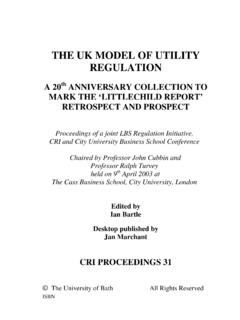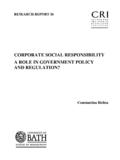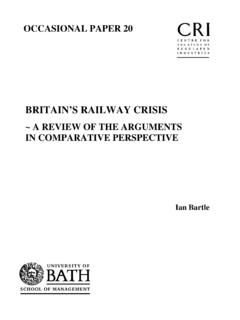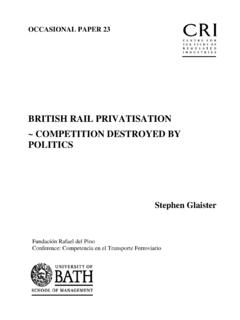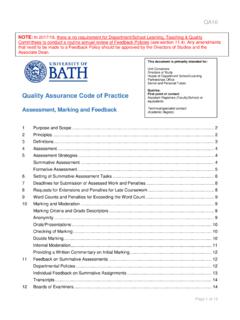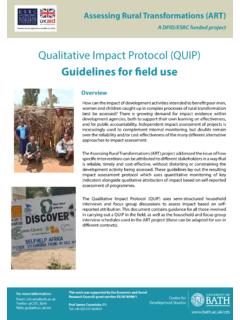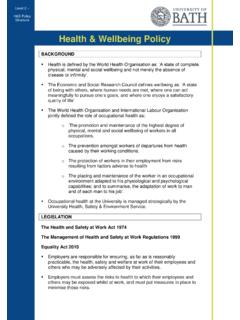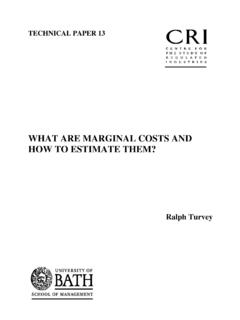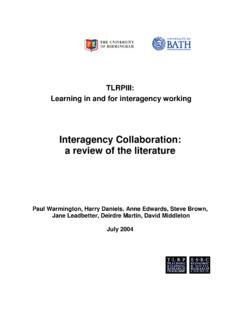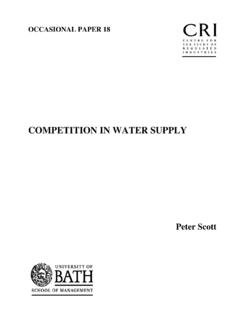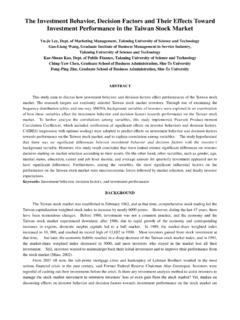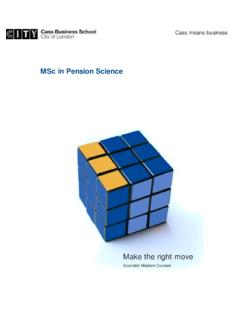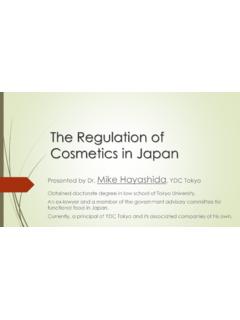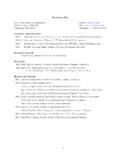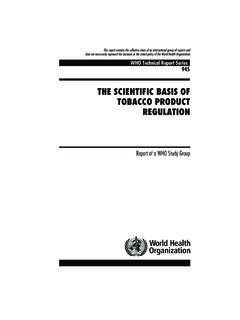Transcription of ECONOMIC REGULATION OF AIRPORTS IN THE UK
1 OCCASIONAL PAPER 21. ECONOMIC REGULATION OF. AIRPORTS IN THE UK. Peter Scott The University of Bath School of Management is one of the oldest established management schools in Britain. It enjoys an international reputation for the quality of its teaching and research. Its mission is to offer a balanced portfolio of undergraduate, postgraduate and post-experience programmes, research and external activities, which provide a quality of intellectual life for those involved in keeping with the best traditions of British universities. ECONOMIC REGULATION OF. AIRPORTS IN THE UK. CRI Occasional Paper 21. Peter Scott Desktop published by Jan Marchant The University of Bath All rights reserved ISBN.
2 Centre for the study of Regulated Industries (CRI). The CRI is a research centre of the University of Bath School of Management. The CRI was founded in 1991 as part of the Chartered Institute of Public Finance and Accountancy (CIPFA). It transferred to the University of Bath School of Management in 1998. It is situated on the 8th floor of Wessex House (North), adjacent to West car park. The CRI is an interdisciplinary research centre investigating how REGULATION and competition are working in practice, both in the UK and abroad. It is independent and politically neutral. It aims to produce authoritative, practical contributions to regulatory policy and debate, which are put into the public domain.
3 The CRI focuses on comparative analyses across the regulated industries. CRI activities and outputs include: Regulatory statistics, information and analysis Discussion papers and Occasional papers Regulatory Briefs, Reviews and International series Research Reports and Technical papers Seminars, courses and conferences Direct links with regulated industries, the regulators, the academic community and other interested parties are an important feature of the work of the CRI. The CRI is non-profit making. Its activities are supported by a wide range of sponsors. BAA Network Rail CIPFA OFWAT. Department of Trade and Industry RSM Robson Rhodes Environment Agency Royal Mail National Audit Office Thames Water NERA United Utilities National Grid Transco Wessex Water Further information about the work of the CRI can be obtained from:- Peter Vass, Director-CRI, School of Management, University of Bath, Bath, BA2 7AY.
4 Or CRI Administrator, Jan Marchant, Tel: 01225 383197, Fax: 01225 383221, e-mail: and from the CRI's web site, which includes events and the publications list. Publications and publications list can be obtained from Jan Marchant as above. PREFACE. The CRI is pleased to publish Occasional Paper 21 on ECONOMIC REGULATION of AIRPORTS in the UK by Peter Scott, who is director of an independent business economics consultancy company, MMD. The paper focuses on the potential for deregulation, particularly as AIRPORTS ' customers are the powerful' airlines. AIRPORTS have always been regulated differently from other utility and network industries, not least by having the Competition Commission directly involved in each periodic review, rather than only on appeal, and this is an opportunity to take advantage of the particular characteristics of the AIRPORTS ' business.
5 If negotiated outcomes can be the objective, without regulatory intervention, but with regulatory oversight to monitor, encourage self- REGULATION and provide a failsafe, lighter touch REGULATION is in prospect. The CAA's recent consultation paper demonstrated that it is willing to engage in discussion aimed at more cost-effective REGULATION , and success in the AIRPORTS ' sector will surely have lessons for the other regulated industries. The CRI would welcome comments on the occasional paper. Comments should be addressed to: Peter Vass Director CRI. School of Management University of Bath Bath, BA2 7AY.
6 The CRI publishes work on REGULATION by a wide variety of authors, covering a range of regulatory topics and disciplines, in its International, Occasional and Technical Paper series. The purpose is to promote better understanding and debate about the regulatory framework and the processes of decision-making and accountability. Enquiries or manuscripts to be considered for publication should be addressed as above. The views of authors are their own, and do not necessarily represent those of the CRI. Peter Vass Director, CRI. September 2004. iii iv CONTENTS. Page Preface iii Synopsis vi Introduction 1.
7 ECONOMIC REGULATION of AIRPORTS 2. ECONOMIC REGULATION of designated AIRPORTS 4. Do AIRPORTS need heavy' ECONOMIC REGULATION ? 5. Market power 5. Likelihood of abuse 7. Is ECONOMIC REGULATION the answer? 9. Has ECONOMIC REGULATION worked? 10. International obligations 14. Conclusion 15. References 16. v Synopsis The Civil Aviation Authority has been regulating airport charges since 1986. Is it time for it to stop? Fifty AIRPORTS are subject to its ECONOMIC REGULATION but only four to the heavy' version considered here: Heathrow, Gatwick, Stansted and Manchester. The CAA has resisted calls to add to this number.
8 These four AIRPORTS are used by two-thirds of UK air travellers and have some market power, though not unlimited and in varying degrees. The main barriers to entry are the cost of new facilities and the planning system. Last year's White Paper has reinforced these barriers, notably in the South East. But AIRPORTS are unlike other regulated utilities: they only have a few, powerful customers and they have a common interest with their customers in maximising the number of passengers. The major issues affecting the development of airport capacity in these AIRPORTS are not issues of ECONOMIC REGULATION but of public policy (planning, transport policy, limits on aircraft movements, constraints on runway use).
9 ECONOMIC REGULATION of AIRPORTS is not an exact science but rather a matter of making judgments in the midst of great uncertainty. Whether it is worth making the judgments depends on the effect they have and the likely alternative. Regulating airport charges has had, and is expected to have, very little effect on passenger prices and the prices actually charged to airlines are often below the allowed maximum. Regulating airport charges does not seem to have had much effect on the efficiency with which airport assets are used. Using airport charges to clear the market at congested AIRPORTS would mean a vast transfer of resources from airlines to AIRPORTS and is, in any case, prohibited under the UK-USA air traffic agreement.
10 Regulating airport charges has had very little effect so far on the quality of service provided by AIRPORTS . Attempts are now being made in this direction, but it is hard to see why the regulator should be expected to guess right about the different trade-offs airlines want to make between price and quality. Regulating airport charges has costs in the regulator and the regulated. International obligations do not appear to prevent a move away from heavy' ECONOMIC REGULATION of airport charges. There accordingly seems to be a strong case for removing the designation of these four AIRPORTS as subject to heavy' ECONOMIC REGULATION .
